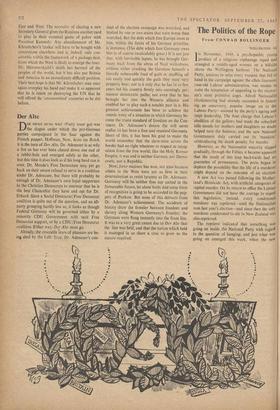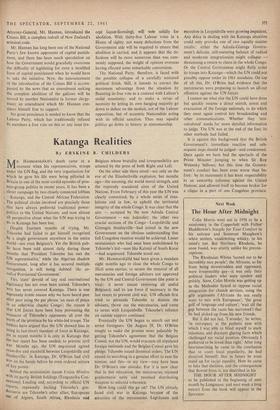The Politics of the Rope
From CONRAD BOLLINGER
WELLINGTON,
N November, 1949, a psychopathic young 'product of a religious orphanage raped and strangled a middle-aged woman on a hillside above the Wellington harbour. The National Party, anxious to seize every weapon that fell to hand in the campaign against the effete fourteen- year-old Labour administration, was unable to resist the temptation of appealing to the elector- ate's most primitive urges. Adroit Nationalist electioneering had already succeeded in fasten- ing an unsavoury, popular image on to the Labour Party—assisted by the party's ageing and inept leadership. The final charge that Labour'; abolition of the gallows had made the suburban hills unsafe for mothers and daughters no doubt helped turn the balance; and the new National Government duly carried out its 'mandate: reintroducing the death penalty for murder.
However, as the Nationalist majority slipped' gradually, through the Fifties, it became apparent that the result of this leap backwards had no guarantee of permanence. The press began to deplore the possibility that the life of a murderer might depend on the outcome of an election.
A new Act was passed following the Mother- land's Homicide Act, with artificial categories of capital murder. On its return to office the Labour Government did not have the courage to repeal this legislation; instead, every condemned murderer was reprieved—until the Nationalists won last year'S election—and since then the only murderer condemned to die in New Zealand was also reprieved.
The reprieve indicated that something was going on inside the National Party with regard to the question of hanging; and just what was going on emerged this week. when the new Attorney-General, Mr. Hannan, introduced the Crimes Bill, a complete redraft of New Zealand's criminal code.
Mr. Hannan has long been one of the National Party's few known opponents of capital punish- ment, and there has been much speculation on how the Government would gracefully overcome the difficulty of legislating for even a modified form of capital punishment when he would have to take the initiative. Now, the •announcement of the introduction of the Crimes Bill is accom- panied by the news that an amendment seeking the complete abolition of the gallows will be moved by another Nationalist (a former clergy- man); an amendment which Mr. Hannan con- siders himself free to support.
No great prescience is needed to know that the Labour Party, which has traditionally refused its members a free vote on this or any issue (ex- cept liquor-licensing), will vote solidly for abolition. With thirty-five Labour votes in a House of eighty, not many defections from the Government side will be required to ensure that abolition is carried, and it appears that the de- fections will be more numerous than was com- monly supposed, the weight of opinion overseas having effected some remarkable conversions.
The National Party, therefore, is faced with the possible collapse of a carefully nurtured political fetish. Still, it intends to extract the maximum advantage from the situation by flaunting its free vote as a contrast with Labour's stolid unanimity; and to make a virtue of necessity by letting its own hanging majority go down to defeat on the motion, not of the Labour opposition, but of eccentric Nationalists acting with its official sanction. Thus may squalid politics go down to history as statesmanship.











































 Previous page
Previous page